Alayne McGregor
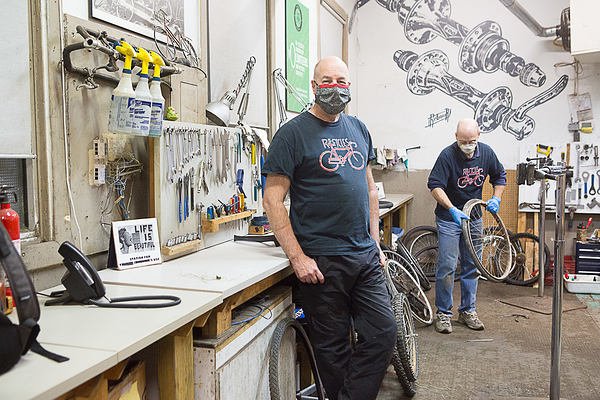
re-Cycles, Ottawa’s not-for-profit volunteer-run bike recycling shop, needs a new home.
The building in which the shop operates, at 473 Bronson at Gladstone, has been sold, said re-Cycles President John Gibson. The shop’s lease expires December 31, although it may get an extension, and it plans to move before spring.
It’s been actively looking for the past few weeks, but hasn’t yet found a large, central, affordable, and easily accessible new location.
If you need a used bike, bike parts, tires, tubes, or even used bike shoes, re-Cycles is the place to go in Ottawa. The shop accepts any and all donated bikes for adults and children. The ones in good shape it cleans up and sells; the ones that need a bit of work, it refurbishes and sells; the others not in usable shape (about one-third of the donations) it strips for any useful parts and sells the metal to a scrap metal dealer.
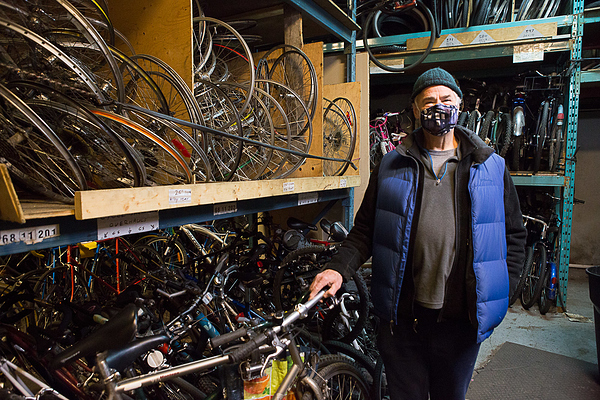
“There is a wonderful sense of satisfaction when we take an old or neglected bike, breathe new life into it, and save it from a possible landfill fate. And that satisfaction is complete when someone buys one of our bikes and gets it back on the street!” the re-Cycles website says.
This month is your last chance to see the current location; the shop will close for its regular winter break after November 26. Until then, it’s open on Tuesday and Thursday evenings from 6 to 8 p.m. Bike sales are by cash or e-transfer; parts are by cash only.
The best month to find bikes
It’s also an ideal time to buy from the store, Gibson said, because its inventory of bikes and parts is higher from donations over the summer and fall and there’s more selection. In peak periods in the spring, a refurbished bike is sold almost as soon as it reaches the shop floor. The other good time to buy from re-Cycles is just after it reopens in late winter, when the snow and slush on the streets still deter casual cyclists, he said.
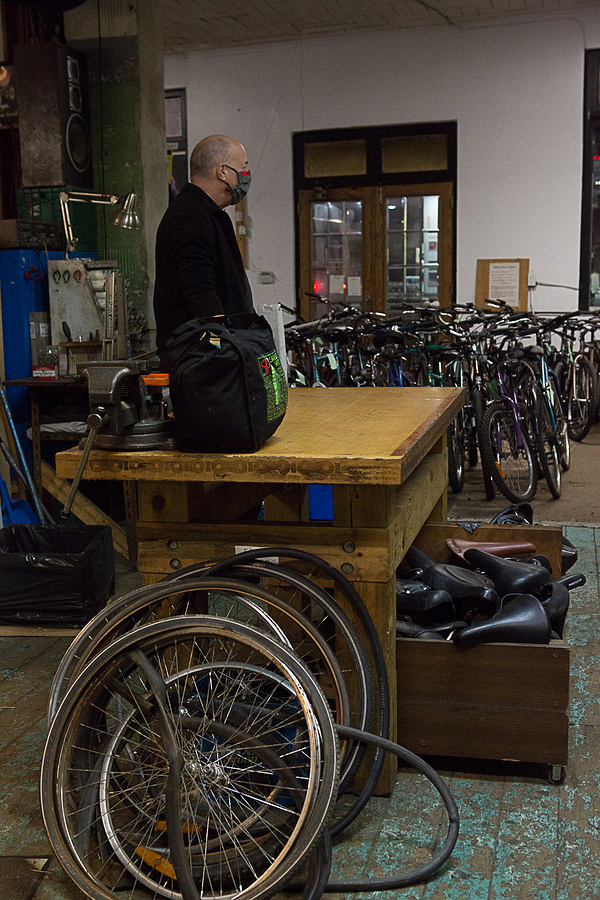
Alayne McGregor/The BUZZ
Each bike has a piece of paper indicating how it’s been checked, the condition of its parts, and what work has been done on it. At a minimum, the brakes, headset, gears/shifters, chain, bottom bracket, and wheels and tires are checked and the bike’s serial number (important if a bike is stolen) is determined. Refurbished bikes are accompanied by a two-page checklist of everything checked, fixed, and replaced on the bike, and have a 30-day warranty.
Bike prices are mostlybetween $80 and $200, but may be a bit more for some bikes.
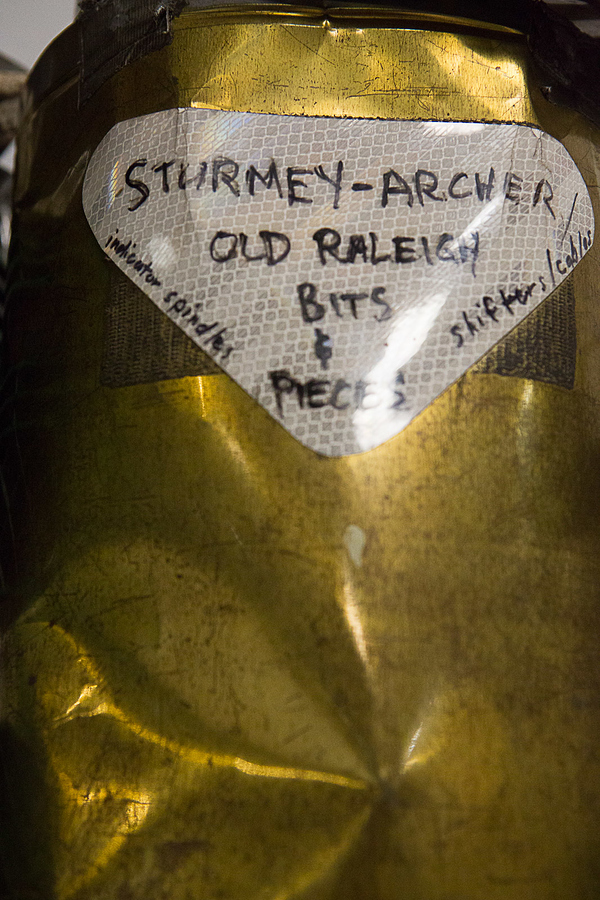
Gibson also noted that, because of the wide range of bikes it receives, re-Cycles carries parts for rarer and older bikes as well as standard city bikes. For example, there’s a large metal jar in the parts bin area that contains vintage Sturmey-Archer and Raleigh parts.
DIY bike repair closed
Before the pandemic, an equally important part of the store was its fully equipped bicycle repair shop, where cyclists could use the store’s space and tools for a small hourly charge, and learn how to do their own repairs under the guidance of experienced volunteer mechanics. Four or five cyclists–and sometimes a few more during the peak spring period–could share the workbenches and truing stands.
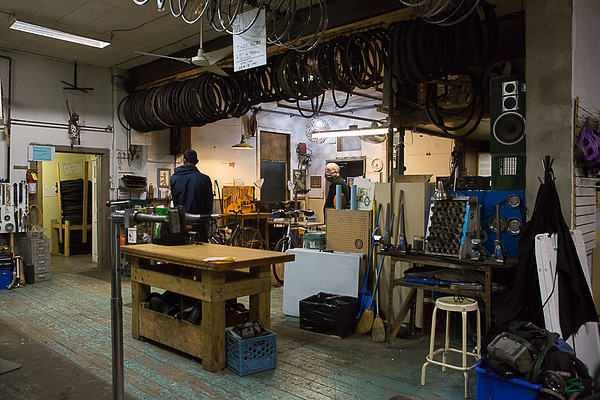
Alayne McGregor/The BUZZ
That had to close “because we need to be close to people when we’re coaching them on how to repair their bikes. It just wasn’t the right thing to do to respect our own volunteers’ safety and the safety of our customers.”
Because of the pandemic, bike shoppers had to stay outside the shop until recently, when a small area was set up just inside the door for one shopper at a time. Parts sales are done through a separate service window. For both bikes and parts, lineups are outside, and people are asked to wear masks and keep their distance from each other. Bikes are sold on a time ticket system, with eight tickets given out at 6 p.m. each evening.
That didn’t hurt sales. In fact, Gibson said, up to the end of September “we actually sold a few more bikes than we typically do in a year. Demand has been constant.”
He said re-Cycles customers for the most part have been very understanding of the restrictions, greeting them with “patience and regret” and with “good cheer in a difficult environment.” Many also missed the DIY repair shop.
Donations were also up this year: 575 bikes as of the end of September, an increase of over 140 bikes from 2019.
Volunteers learn by doing
Except for part-time coordinator Mark Rehder, who will shortly celebrate his 20th anniversary with the store, all the work is done by volunteers. Volunteers receive credit for each hour worked and can then use the shop to work on their own bikes.
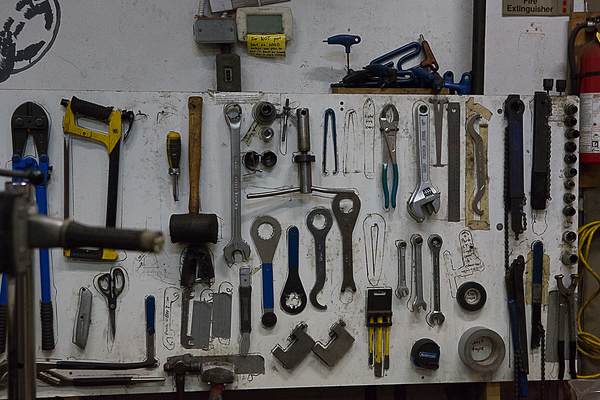
Alayne McGregor/The BUZZ
The shop is run by a 10-person volunteer board. It has about 40 experienced volunteers – mechanics or sales staff – who schedule themselves for regular shifts. Beyond that, Gibson said, there’s as many as 300 casual volunteers who drop in when their schedule allows. “And we do our very best to let them grow their skills in bike mechanicing. Many of our current head mechanics started as volunteers just walking in and saying, ‘Gee, do you think I could work on bikes here?’ ”
“Bikes are an accessible technology”
The chance to work on bikes is a draw, he said. “Bicycles are an accessible technology. There’s a sense of satisfaction and problem-solving in working on a bike and getting it going again. And there’s definitely a social aspect to our volunteers working together in the shop.
“And there’s also satisfaction when we’re able to provide a good-quality bicycle to somebody who’s going to have solid transport for the price of a one-month bus pass!”
Currently sharing the re-Cycles location is the social enterprise Cycle Salvation, which also refurbishes and sells donated bikes while also training people for jobs as bike mechanics. By mutual agreement, the two groups will separate after 2020.
The shop was established in Ottawa in 1996 by Lloyd Deane, who had volunteered at a similar shop in Kitchener. It operated out of donated space, first in Gloucester Centre and then in Lowertown. With a Trillium grant, it was able to rent a space on Nelson Street in 2000.
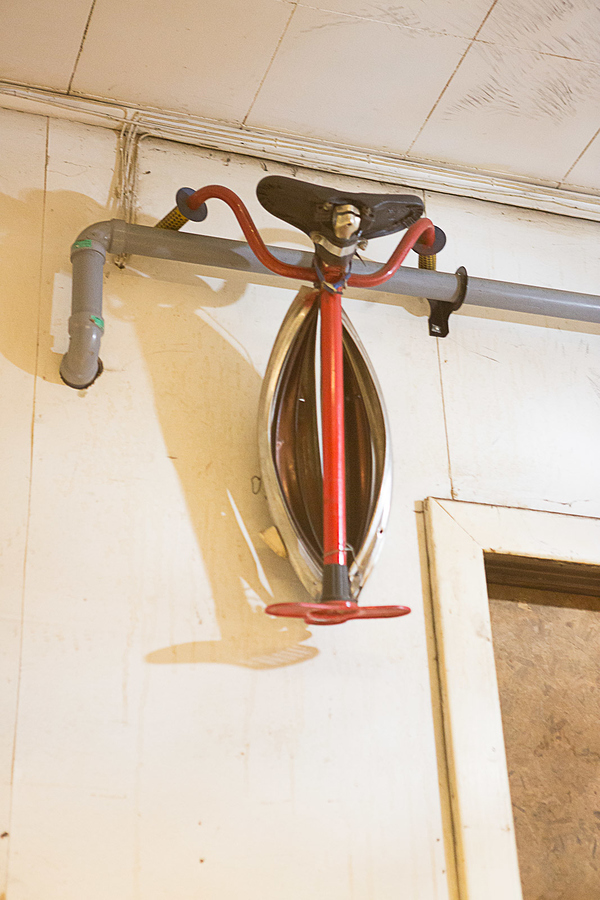
In 2008, it moved to Bronson Avenue and in 2010 it moved next door to its current location. Since then, volunteers have brightened the place with wall murals, a ceiling light made from front derailleurs, and a sculpture of Fendi the Flying Turtle made from bike parts. In 2018, they removed part of a concrete block wall, upgraded the staffroom, and relocated the bathroom to improve service.
Within the shop, everything is well-organized: tires and wheels hang from the ceiling and are brought down by long hooked sticks; tools hang from pegboards in front of workbenches; small parts are sorted into a series of bins and drawers, and larger parts like forks are stored in floor bins. In the back, bikes are disassembled for parts and old tires and scrap metal are stored. Bicycle tubes, sorted by size, are conveniently right by the sales window.
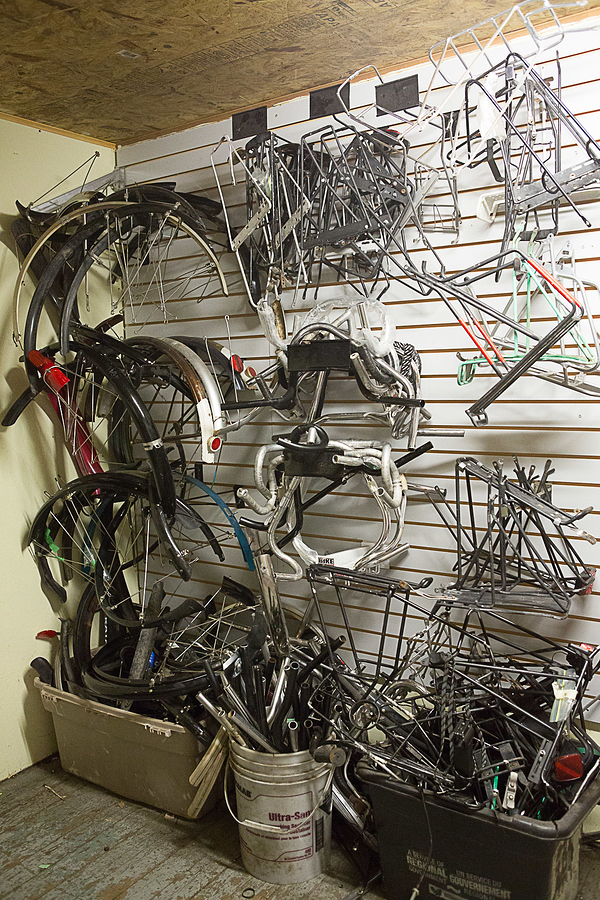
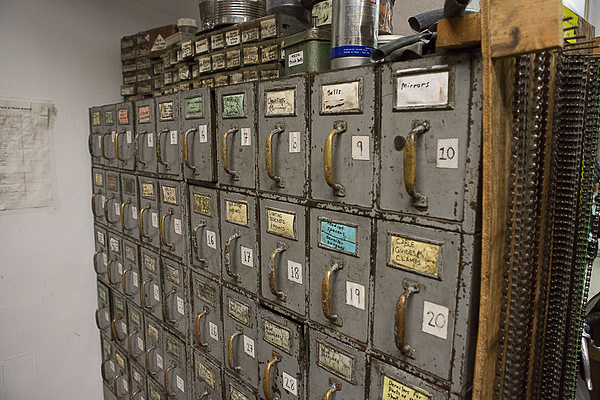
Gibson emphasized that re-Cycles did not compete with local bike shops: “The bulk of our bicycles are a little older, tend more toward the basic model end of things.” It does sell a few new parts like cables or chains, either for safety reasons, or because they are awkward to find at odd hours but necessary to ride your bike. Sometimes bike shops also give parts that are worn but still serviceable to re-Cycles, he said.
The shop also helps community organizations; for example, it recently donated 15 children’s bikes to the Strathcona location of Ottawa Community Housing (OCH), “which were very well-received, and we have 30 more children’s bikes earmarked for their future clients.” It also donated 14 children’s bikes to the Carlington Community Centre, and has previously donated to the east-end group Helping with Bikes.
Gibson said he’d appreciate any leads for a new re-Cycles location by email at president@re-cycles.ca. The shop’s wishlist is: a central location, with safe access by bike, transit, car, or foot; affordable for a self-sustaining non-profit organization; and about 2000 sq. ft. A cycle-friendly street nearby for people to do test rides would be ideal. “We’re not looking for high-end retail space because every dollar we spend on rent is a dollar that does not go into providing bicycles at low cost to our customers.”
Still looking for the right spot
The current intense redevelopment in Centretown does pose some problems. “It’s a great story that Centretown is developing – we’re happy about that – but it does leave us with a smaller selection for places that are good enough and big enough, and where we would not be getting in the way of an upscale designer clothing store.”
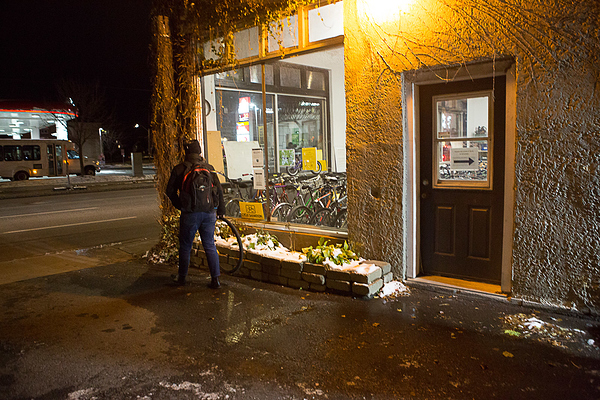
He said the search has been “both encouraging and a little bit challenging. There are a few places that are pretty good candidates right now but are slightly above our snack bracket. Some are not in an ideal location. Some would be awkward for our customers; there’s a couple of basements that are plenty big but I don’t know how much you relish taking your bike up and down the stairs.
“We’re really very hopeful and optimistic because there are some pretty good candidates out there. But this is still a very new development for us.”
In the new location, he said, re-Cycles would like to increase its capacity during peak season “because we hate to turn people away when they came to work on their bicycles and the lineup was just too long and there were too many people working ahead of them. We need to do that in steps to make sure we can manage each step.”
It also wants to increase its connections with the community, “as part of our support to diverse communities and in recognition that our location is one where we don’t get a lot of children coming in but there are a lot of children in town who could use a bike.”
re-Cycles has every intention of continuing, he said. “We’ll carry on doing our very best providing folks with good quality used bicycles as low as we can manage to sell them, with used parts, and help for DIY.”
